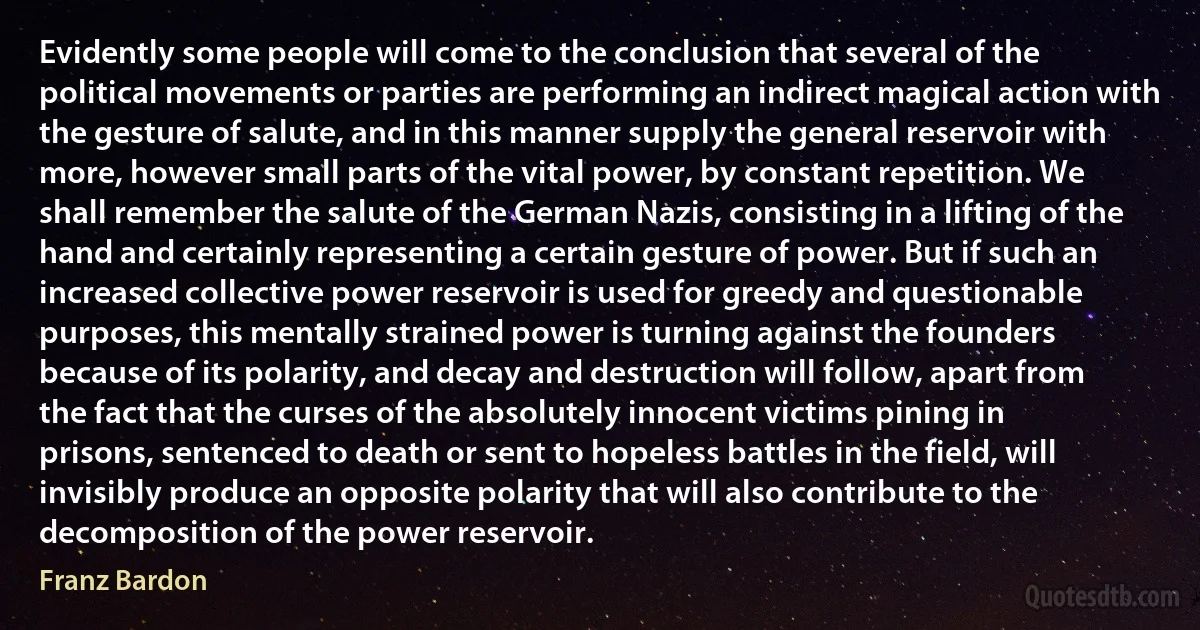
Evidently some people will come to the conclusion that several of the political movements or parties are performing an indirect magical action with the gesture of salute, and in this manner supply the general reservoir with more, however small parts of the vital power, by constant repetition. We shall remember the salute of the German Nazis, consisting in a lifting of the hand and certainly representing a certain gesture of power. But if such an increased collective power reservoir is used for greedy and questionable purposes, this mentally strained power is turning against the founders because of its polarity, and decay and destruction will follow, apart from the fact that the curses of the absolutely innocent victims pining in prisons, sentenced to death or sent to hopeless battles in the field, will invisibly produce an opposite polarity that will also contribute to the decomposition of the power reservoir.
Franz BardonRelated topics
action apart certain constant death decomposition field follow general gesture hand innocent lifting people polarity power produce reservoir sent small turning vital curses parts representingRelated quotes
The theories that I (and others) helped develop explained why unfettered markets often not only do not lead to social justice, but do not even produce efficient outcomes. Interestingly, there has been no intellectual challenge to the refutation of Adam Smith's invisible hand: individuals and firms, in the pursuit of their self-interest, are not necessarily, or in general, led as if by an invisible hand, to economic efficiency. The only question that has been raised concerns the ability of government to remedy the deficiencies of the market. Within academia, a significant fraction of economists are involved with developing and expanding on the ideas of imperfect information (and imperfect markets) that I explored. For instance, Edmund Phelps, this year's Nobel Prize winner, belongs to this "school" of thought. But in political discourse, simplistic "market fundamentalism” continues to exert enormous influence.

Joseph Stiglitz
Spontaneous social action will be broken up over and over again by State intervention; no new seed will be able to fructify. Society will have to live for the State, man for the governmental machine. And as, after all, it is only a machine whose existence and maintenance depend on the vital supports around it, the State, after sucking out the very marrow of society, will be left bloodless, a skeleton, dead with that rusty death of machinery, more gruesome than the death of a living organism. Such was the lamentable fate of ancient civilisation. ... Already in the times of the Antonines (IInd Century), the State overbears society with its anti-vital supremacy. Society begins to be enslaved, to be unable to live except in the service of the State. The whole of life is bureaucratised. What results? The bureaucratisation of life brings about its absolute decay in all orders.

José Ortega y Gasset
Unless we address those problems from the point of view of a world where development is genuinely sustainable, where protection of the environment is vital, where the earth's wealth is redistributed in favour of the poorest people in the poorest countries, in the next few years we shall face a growing imbalance between north and south. Ever-increasing numbers of people will flee from environmental destruction-from rain forest destruction, increased desertification and the increased flooding linked to that. Millions of people will have to flee from the places where they grew up and live and there will be growing imbalances in the world, and growing poverty. There has to be a change in the relationship. That means that higher prices must be paid for commodities. It means that there must be an increased aid programme, and an understanding that we are all in this together.

Jeremy Corbyn
Just as the various trades are most highly developed in large cities, in the same way food at the palace is prepared in a far superior manner. In small towns the same man makes couches, doors, plows and tables, and often he even builds houses, and still he is thankful if only he can find enough work to support himself. And it is impossible for a man of many trades to do all of them well. In large cities, however, because many make demands on each trade, one alone is enough to support a man, and often less than one: for instance one man makes shoes for men, another for women, there are places even where one man earns a living just by mending shoes, another by cutting them out, another just by sewing the uppers together, while there is another who performs none of these operations but assembles the parts, Of necessity, he who pursues a very specialised task will do it best.

Xenophon
In 1872 we sent to the protected countries of Europe and to the United States of America 116,000,000 of exported manufactures. In 1882...it fell to 88,000,000. In 1892...it fell to 75,000,000. In 1902, last year, although the general exports had increased, the exports of manufactures had decreased again to 73½ millions. And the total result of this is that after 30 years you are sending 42½ millions of manufactures less to the protected countries than you did 30 years ago. Then there the neutral countries...they have fallen 3½ millions...you have lost altogether in your export of manufactures 46 millions. How is it that that has not impressed the people before? Because the change has been concealed by our statistics... You have failed to observe that the continuance of your trade is dependent entirely on British possessions. While these foreign countries have declined 46 millions your British possessions have increased 40 millions.

Joseph Chamberlain
